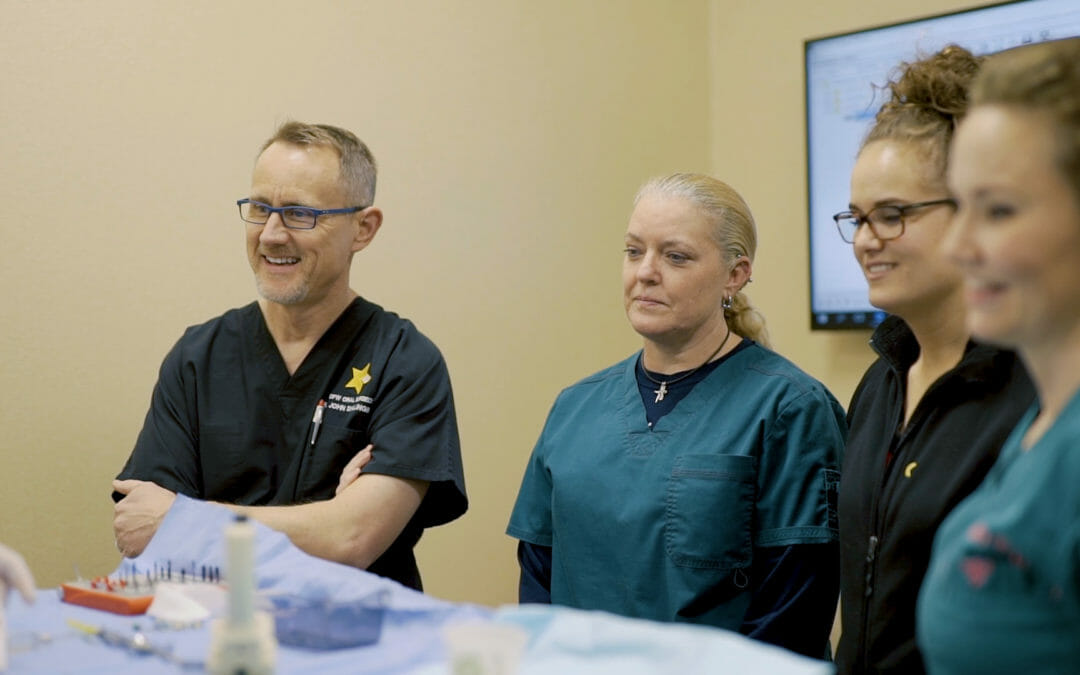If you need dental surgery, you might be wondering if you should see your dentist or if you should find an oral and maxillofacial surgeon. Read on to find out why it’s important to see a specialist when it comes to oral surgery.
Why Should I See a Specialist for Dental Surgery?
When it comes to any kind of surgery, you want to choose a surgeon who has the most expertise and experience with your particular procedure. That’s why it’s important to choose an oral surgeon for any dental surgery you might need. Their years of experience will ensure that your procedure is performed the safest, most efficient way, with the most up-to-date techniques and tools. They perform the same specific surgeries regularly and therefore are more accomplished and efficient. Most specialists invest in procedure-specific materials and equipment, which increases patient comfort and surgical success.
What Makes a Surgeon a Dental Specialist?
Doctors or general dentists that go on to become oral surgeon specialists receive extra post-graduate training in oral and maxillofacial surgery. These surgeons complete at least four years of additional surgical hospital residency and are trained to diagnose and treat problems with your mouth, jaw, teeth, gums, and even your neck.
What Kind of Surgery Do Oral Surgeons Perform?
Oral surgeons are qualified to perform a wide range of surgeries related to your mouth and jaw, including:
- Bone grafting – if you have a jaw deformity, you might need a bone grafting procedure. A deformity can be the result of an injury or something you’re born with. Either way, an oral surgeon should be your first choice for repair.
- Facial trauma – if you’ve been in an accident that results in facial trauma, you want to have a specialist who knows what they’re doing to minimize scarring and support you emotionally.
- Dental implants – an experienced oral surgeon can replace missing teeth and stop the progress of bone atrophy, resulting in a beautiful smile.
- Tooth extraction – whether it’s a single tooth or all four wisdom teeth, an oral surgery specialist should be the one to extract a tooth when it’s medically necessary.
- Sinus lift – if a deviated septum or other sinus abnormality gets in the way of the placement of a dental implant, an oral surgeon can perform a sinus lift procedure in order to prevent further damage to the sinus cavity and surrounding jawbone.
- Ridge augmentation or expansion – if you’ve experienced significant oral bone loss, you might require this procedure to return your mouth to a healthy state and prepare it for additional procedures like dental implants.
- Reconstructive surgery – when multiple oral health issues are present, you might require significant reconstructive surgery. An experienced oral surgeon will know the best techniques and methods to get your oral health back on track.
- Gum grafts – if your gums look like they are starting to pull away from your teeth, you are likely suffering from advanced gum disease. A gum graft can prevent this condition from worsening and causing other oral health issues.
How Do I Find the Best Oral Surgeon?
The best oral surgeons, like, will have many years of experience, as well as critical board certifications and affiliations. Look for a surgeon who:
- Is certified by the American Board of Oral and Maxillofacial Surgeons.
- Will perform procedures with anesthesia, as indicated, for your comfort.
- Has a clean facility with modern technology.
- Can diagnose and treat not just dental problems, but also facial injuries, fractures, and any other causes of facial pain.
You may also want to take into consideration how quickly you can be evaluated by the surgeon depending on the severity of your concerns.
When Should I Look for an Oral Surgeon Specialist?
There are a number of scenarios that may require you to see a specialist for dental surgery. Your general dentist may refer you to an oral and maxillofacial surgeon if you need significant surgery, or you may choose to seek one out yourself for any of the following reasons:
- Wisdom teeth extraction
- Dental implants
- Root canal in a molar
- Multiple cavities
- Full mouth rehabilitation
- Temporomandibular Joint Disorder/ TMD (also called TMJ)
- Significant facial injuries that involve the mouth or jaw.
If you aren’t sure whether or not you need to see a dental specialist for oral surgery, you should consult with your primary care physician or your general dentist. You can also reach out to a reputable oral surgeon in your area to schedule a consultation.
At DFW Oral Surgeons, we strive for excellence when it comes to treating our patients. Our physician is certified by the American Board of Oral and Maxillofacial Surgeons and has many local and national affiliations. Our state-of-the-art facility is equipped with the most modern technology to serve our patients safely and comfortably. Contact us today to schedule a consultation!

